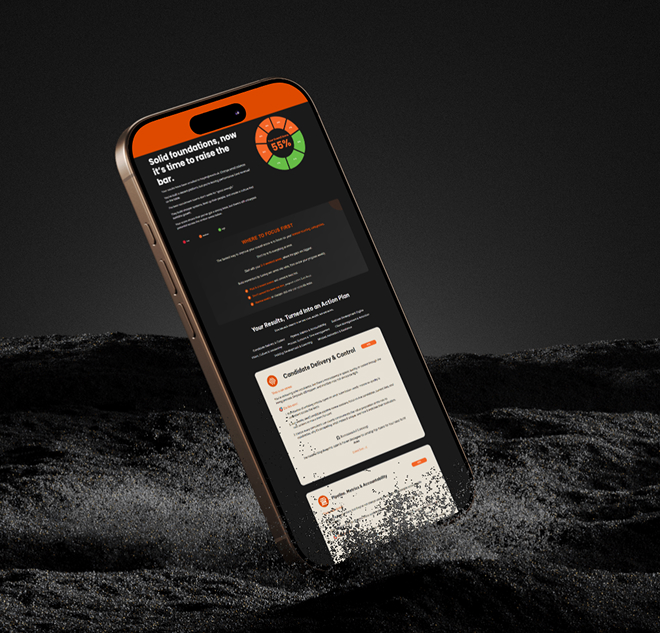The importance of empathy in leadership
Being a leader and managing a team is one of the hardest jobs in the world in recruitment.
Whether you’re billing or non-billing, or even have aspirations to manage a team in the future, the complexities of people management and creating an inspiring team culture takes skill and patience.
Recruitment is a mentally (and dare I say) physically taxing job.
We’re driven by targets, motivated by results, and measure our success on our output. In management, it can be easy to take that approach and forget the importance of being human!
What you end up creating with this approach, is a transactional manager to consultant relationship, instead of something that is more holistic which adds long-term value and creates trust.
This edition is going to be all about empathy in leadership and how you can cultivate empathy to connect with and understand your team better, thus producing the results you’re looking for!
I’m a firm believer that empathy can be learned over time, and the best leaders use empathy as their #1 way to motivate their team.
A lot of you have probably heard of Simon Sinek already, but for those of you who haven’t, he regularly talks about empathy being the strongest instrument in a leaders’ toolbox.
It gives you relatability, and most importantly, shows that even successful leaders can still make mistakes.
But, before we get into the practical side…
I want you to sit and think back to your first day in recruitment.
The day you walked through the doors on to the sales floor (or logged on if you were onboarded virtually).
How did you feel that day? Scared, excited, apprehensive? Or, maybe you came in without a preconceived idea and just wanted to see where the journey took you.
Regardless, those first few weeks are always pretty transformative. You get the lay of the land of who is friends with whom, who the “top biller” is and what the social scene is like.
Then, you have your manager. What was your initial impression of this person? Did they make you feel comfortable or did you have a knot in your chest the whole time? Or, did you find it hard to build a relationship with them due to your interactions solely being about your performance?
Now, I want you to think about the best manager you ever had (in recruitment or not) and think about what made them such a good manager.
Was it because you knew what they did on the weekends and they had a great sense of humour? Was it because they let the “small stuff” slip or was it because they understood you as a person?
We’ve all had great leaders, and we’ve all had bad leaders.
To become the former and not the latter, you’ve got to try and model your behaviours on the best manager you ever had – because I’m sure they were leading with empathy, you just didn’t know it…!
The carrot vs stick analogy is commonly used in recruitment.
To lead with the carrot is to lead with reward and positivity, and the stick analogy is to (metaphorically) poke and instil fear in that individual to extract good performance.
Although the stick approach can work for some personality types, long-term it simply isn’t the way to lead.
Leading with empathy doesn’t make you weak
Empathy has often been coined as a sign of weakness, when instead breaking it down simply means that you can relate with someone’s emotions.
When someone in your personal life is feeling low, do you check in to see how they are? I’m sure you do. This reaction should be no different for someone you’re leading.
Empathy is about bringing humanity and humility into your management style, and recognising that sometimes, people will have bad days, people will perform poorly, and people may also have an attitude from time to time.
Understanding and accepting this will allow you to relate to that individuals’ situation effectively as and when it happens.
So, just to reiterate – empathy is not a weakness!
Leading with empathy allows you to bring your true self to work
Putting up a facade of being a “strong leader” can feel inauthentic, especially if you can’t be yourself around your team, for the fear of being perceived differently.
Leading with empathy allows you to be yourself, and ultimately gain the respect of your team quicker than you’d think! It’s a selfless way to lead (in my opinion).
Another great example of leading with empathy was demonstrated by Spanx CEO Sara Blakely, who gifted every employee $10,000 as well as two first-class tickets to a destination of their choice.
Her decision came after their deal with Blackstone. Her reasoning was because she wanted to share her success with everyone – and no doubt this gift was a subtle nod to how we’ve all been locked inside due to the Covid-19 pandemic.
Although you may not have the bandwidth to do a grand gesture like this, it’s the action behind it that makes it so powerful!
How can you start leading with empathy?
Respond, don’t react
It can be so easy to react immediately to situations, whether this is in a positive or negative way.
Let’s use the example of a deal falling through or a candidate rejecting an offer from someone in your team.
Regardless of tenure, if you’re managing them, responding immediately may end up leaving that individual feeling worse, especially if they’re in a group setting.
Instead, focus on responding to the situation in a considered way. This may be having a meeting later on in the day, or keeping it more casual and going for a coffee outside the office.
Another situation you may react to rather than respond to is if someone in your team has suddenly dropped in performance, and is turning up late for team meetings.
It can be frustrating when this happens, and it’s natural to take it personally and have a certain level of frustration at the sudden switch.
However, if you focus on responding with thought behind your words, rather than a knee-jerk reaction, you can get a better understanding of why this is happening by approaching the situation with empathy.
Put yourself in the other person’s shoes
Before delivering feedback as a leader, or even communicating on a day-to-day basis, think about how your words and actions will impact those in your team.
Put yourself in the other person’s shoes and do some problem-solving in your mind to help you navigate each situation better.
That, in itself, is leading with empathy.
Practice saying sorry and thank you more
Vulnerability is an incredible skill to have in your leadership toolbox.
Saying sorry is a strength instead of a weakness, it allows your team members to recognise that you are also capable of making mistakes, but also owning that!
Additionally, saying thank-you and being more appreciative in itself goes a long way.
Practical leadership exercises you can do with you team taken from the podcast.
Harry Thornton from Orama Solutions joined us on the podcast last year and we unpacked his journey into becoming a better leader.
One of the things he did that we loved was he intentionally made space for his team to give him feedback on his leadership.
This is what the exercise involved, and it may be worth trying out with your team …
Stop. Start. Continue.
In your next monthly one-to-one with your team members ask them to do the following.
List 3-5 things they want you to stop doing as their leader.
List 3-5 things they want you to start doing as their leader.
List 3-4 things they want you to continue doing as their leader.
If you’re intentional with making the space for you and your team to develop and learn then you’re giving yourself the opportunity to develop as a leader much quicker.


